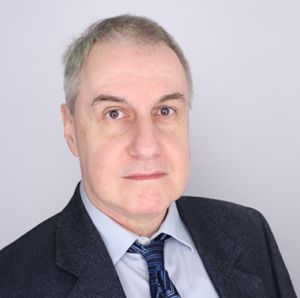
Alexi Kiss is a familiar face in the labs at the GW Cancer Center. He’s filled various roles, in which he has co-mentored dozens of undergrad, graduate, and medical students, as well as pre-doctoral research fellows. Teaching is in his DNA.
After graduating from Semmelweis University Medical School in Budapest, Hungary, he taught microbiology at his alma mater from 1985 to 1995. Ten years after the collapse of Communism in 1989, he came to the United States, landing in St. Louis, MO, as a postdoctoral fellow at St. Louis University School of Medicine and Washington University in St. Louis. He researched viruses, various cell processes, and finally skin cancer. Lucky for us, he found his way to the GW Cancer Center.
What's your story?
It’s a long and a bit complicated story. I grew up in Hungary, where I received my medical degree. However, I was more interested in research, so that’s the path I followed, which took me to 12 different labs in five different countries. I worked in Tatiana Efimova’s lab, studying the role of p38 MAPK in skin inflammation and carcinogenesis. I also served the GW research community in the GW Office of Laboratory Safety in 2021. Now I manage Dr. Pavani Chalasani’s lab and help with her research.
What gets you out of bed in the morning? What motivates you?
Coffee helps a lot, but what really keeps me going is knowing that the work I do has positive, long-term outcomes. I’ve worked in many fields and have a broad background in molecular and cell biology and cancer biology, including animal cancer models. That experience, along with my lab management experience, allows me to bring a different perspective when I mentor students. I help them see the problem from different angles and maybe explore a different approach that brings them to the solution. It’s very exciting to be working with the next generation of cancer researchers.
What is that one book that has influenced you the most?
There is no one book—there are four. The first is a short story I read as a teenager, The Tale of the Stairs, by Hristo Smirnenski, which I read in Bulgarian. This story helped define me as a person. The second is by the Hungarian scientist Tibor Gánti, Az Élet Princípiuma, or, in English, The Principles of Life. It’s about the potential origins of life and has only gained recognition in the past 10 or 15 years. I am fascinated by his theories.
The third is The Lord of The Rings. I know it may sound corny, but I love this book and have read it many times. Last is the Harry Potter series—I count that as one story—which I read with my daughter, so there are happy memories associated with it.
What absolutely excites you right now?
I’m working on a very complex mouse experiment right now. It is based on the theory that many tumors have a low oxygen concentration inside the tumor and that cancer cells usually switch to low oxygen metabolism, which makes them resistant to chemotherapy, immunotherapy, and radiation therapy. By reversing the low oxygen levels, the tumor cells become more responsive to treatment. It’s very exciting when the research shows promise.
What is the most important thing we should know about you?
Well, I’m old, but I like getting older. I’ve done a lot and worked on many amazing research studies with postdocs and students. I like talking with them about the importance of science, and I always tell them, “Don’t be afraid if your results are not what you expected. It’s just as important to know what doesn’t work as expected as it is to know what does work. That can lead you to the next big discovery.”



